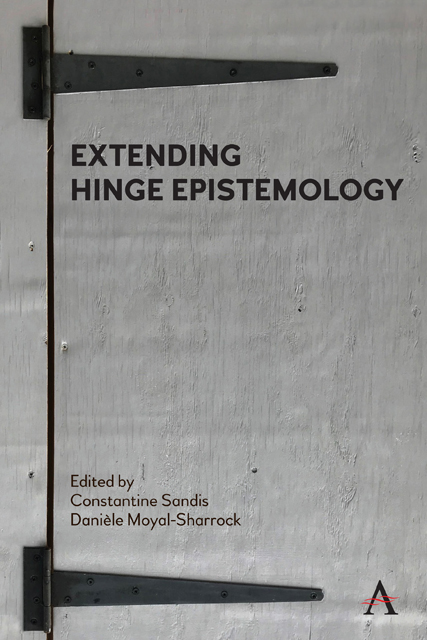Chapter One - Wittgenstein’s Hinge Certainty
Published online by Cambridge University Press: 09 December 2022
Summary
Annalisa Coliva, Duncan Pritchard and I have been enthusiastically engaged with On Certainty for many years and have recognized its importance to the point of coining the expression ‘hinge epistemology’. This was done in the precursor to this collection of essays, which Annalisa and I edited and Duncan published in the International Journal for the Study of Skepticism (6: 2–3, 2016). Our understanding of On Certainty has been very similar in many ways, but differing in others. We thought it might be helpful if the conference started with the three of us clarifying the differences in how we understand Wittgenstein's hinge epistemology. I shall start by summarising my view before saying how it differs from those of my two colleagues.
On my view, Wittgenstein's revolutionary insight in On Certainty is that what philosophers have traditionally called ‘basic beliefs’ – those beliefs that all knowledge must ultimately be based on – cannot, on pain of infinite regress, themselves be propositional beliefs. They are really animal or unreflective ways of acting which, once formulated (e.g., by philosophers), look like propositional beliefs. It is this misleading appearance that leads philosophers to assume that at the foundation of knowledge is yet more knowledge. In fact, although they often resemble empirical conclusions, basic or hinge certainties, or hinges as I interchangeably call them, constitute the ungrounded, nonpropositional, nonepistemic underpinning of knowledge. Situating the foundation of knowledge in nonreflective certainties that manifest themselves as ways of acting is a revolutionary and disconcerting move by Wittgenstein, but it solves the regress problem and puts paid to radical scepticism. This, I have argued elsewhere, makes On Certainty Wittgenstein's third great work.
Before brief ly f leshing out my conception of Wittgenstein's hinge epistemology, I want to mark a distinction in my use of the terms ‘epistemic’ to mean ‘related to knowledge’ and ‘epistemological’ to mean ‘related to the branch in philosophy we call “epistemology” ‘. Therefore, speaking of ‘hinge epistemology’ is to say that hinges have a role to play in epistemology, but it does not imply that hinges are epistemic.
Hinges Are Nonepistemic, Ungrounded and Grammatical
In explicit opposition to Moore, Wittgenstein does not take our basic assurance to be epistemic; he believes it to be more foundational than knowing (OC 414): it ‘lies beyond being justified or unjustified’ (OC 359); and can no more be true than it can be false (OC 205).
Information
- Type
- Chapter
- Information
- Extending Hinge Epistemology , pp. 3 - 26Publisher: Anthem PressPrint publication year: 2022
